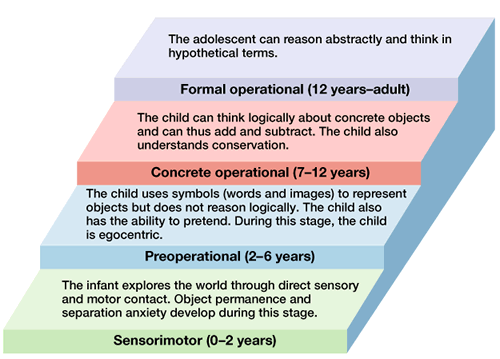Lesson 9: Standardized Measurement and Cognitive Development
Attention

This chart shows the cognitive developmental stages as described by Jean Piaget. This model focuses on QUALITATIVE changes over time as opposed to QUANTITATIVE changes.
Learning Outcomes
Upon completion of this lesson's material, students will be able to:
- Discuss their own philosophy on the use of standardized testing with young children.
- Discuss early childhood science activities
Teaching
Read Chapter 8 in Week By Week
Formal and standardized tests are used in classrooms for many reasons. In our data driven world we crave information that can be sorted, evaluated, compared, calculated and reported. There are many reasons for testing, such as demonstrating outcomes, documenting growth/learning, comparing groups of children, etc. But is this the right way to determine success for young children?
As Howard Gardner discusses in his theory of multiple intelligences, there are a variety of ways in which people learn, therfore there are a variety of ways in which people can demonstrate knowledge. I may be a good written test taker, while my friend is better at completing her science labs. Who truly understands the lesson?
Standardized tests often require children to sit and focus for long periods of time. This is not an easy task for most physically active children. Will their results be accurate and is this the best way to evaluate learning for young children?
Because of these reasons, educators have both positive and negative feelings about standardized tests. Many programs already use or are changing to a standards based assessment system. This means that students demonstrate mastery of standards in subject areas, but not necessarily by taking a written test. They may create a project, write a report, role play, etc. This gives students more opportunity to develop and apply their knowledge using their strongest intelligence and abilities.
STEAM: Science, Technology, Engineering, Arts, Math.
STEAM careers are our future. In recent years there has been a push for educational reform to encourage children to develop these cognitive skills. There has also been an increase in efforts to engage girls in these career paths. It is important for teachers to include science and math activities in the environment and in the daily curriculum. NAEYC provides information about the appropriate way to incorporate Science and Math:
https://www.naeyc.org/files/tyc/file/V4N5/Science_in_the_air.pdf
http://www.naeyc.org/files/naeyc/file/positions/ecmath.pdf
Assessment
Lesson 9 Discussion A
What do you think about standardized testing for children under age 8? What experiences have you or your children had with this type of testing? What recommendations would you make with regards to testing young children?
Lesson 9 Discussion B
Share your favorite preschool Science activity